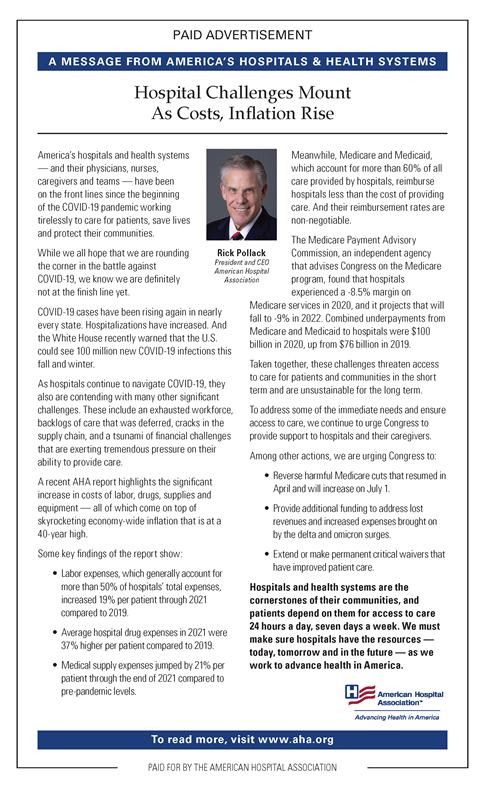Advertorial: Hospital Challenges Mount As Costs, Inflation Rise
by Rick Pollack, President and CEO American Hospital Association
A Message from America's Hospitals & Health Systems
As Seen in The Wall Street Journal
America’s hospitals and health systems — and their physicians, nurses, caregivers and teams — have been on the front lines since the beginning of the COVID-19 pandemic working tirelessly to care for patients, save lives and protect their communities.
While we all hope that we are rounding the corner in the battle against COVID-19, we know we are definitely not at the finish line yet.
COVID-19 cases have been rising again in nearly every state. Hospitalizations have increased. And the White House recently warned that the U.S. could see 100 million new COVID-19 infections this fall and winter.
As hospitals continue to navigate COVID-19, they also are contending with many other significant challenges. These include an exhausted workforce, backlogs of care that was deferred, cracks in the supply chain, and a tsunami of financial challenges that are exerting tremendous pressure on their ability to provide care.
A recent AHA report highlights the significant increase in costs of labor, drugs, supplies and equipment — all of which come on top of skyrocketing economy-wide inflation that is at a 40-year high.
Some key findings of the report show:
- Labor expenses, which generally account for more than 50% of hospitals’ total expenses, increased 19% per patient through 2021 compared to 2019.
- Average hospital drug expenses in 2021 were 37% higher per patient compared to 2019.
- Medical supply expenses jumped by 21% per patient through the end of 2021 compared to pre-pandemic levels.
Meanwhile, Medicare and Medicaid, which account for more than 60% of all care provided by hospitals, reimburse hospitals less than the cost of providing care. And their reimbursement rates are non-negotiable.
The Medicare Payment Advisory Commission, an independent agency that advises Congress on the Medicare program, found that hospitals experienced a -8.5% margin on Medicare services in 2020, and it projects that will fall to -9% in 2022. Combined underpayments from Medicare and Medicaid to hospitals were $100 billion in 2020, up from $76 billion in 2019.
Taken together, these challenges threaten access to care for patients and communities in the short term and are unsustainable for the long term.
To address some of the immediate needs and ensure access to care, we continue to urge Congress to provide support to hospitals and their caregivers.
Among other actions, we are urging Congress to:
- Reverse harmful Medicare cuts that resumed in April and will increase on July 1. •
- Provide additional funding to address lost revenues and increased expenses brought on by the delta and omicron surges.
- Extend or make permanent critical waivers that have improved patient care.
Hospitals and health systems are the cornerstones of their communities, and patients depend on them for access to care 24 hours a day, seven days a week. We must make sure hospitals have the resources — today, tomorrow and in the future — as we work to advance health in America.


